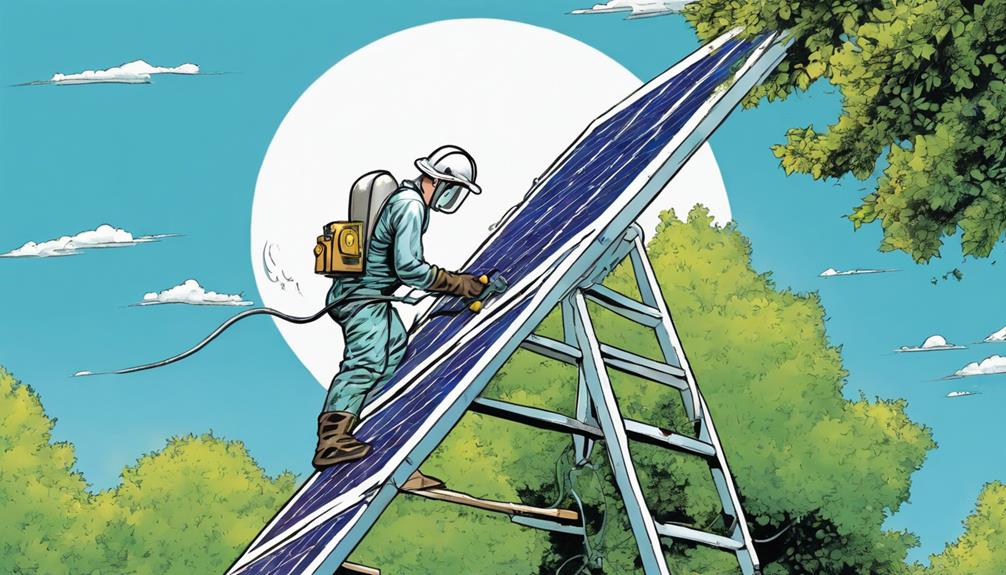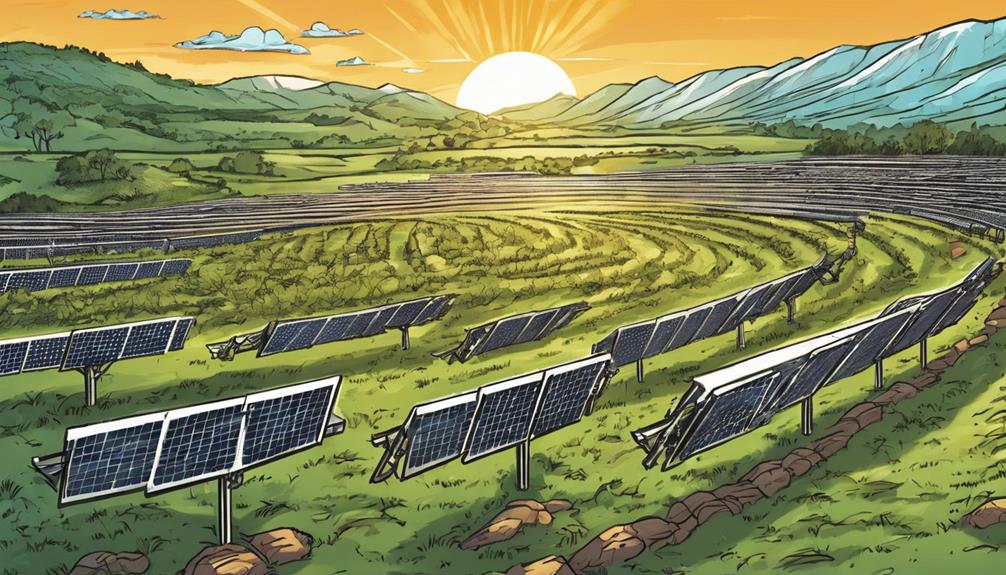To maintain your solar panels running at peak efficiency, you'll want to clean them regularly without causing damage. Use a regular garden hose or telescopic wand with mild cleaning solutions and soft-bristle brushes to avoid scratching the surface. Avoid high-pressure hoses and harsh detergents that can harm the panels. Clean your panels at least twice a year, or more often in areas with heavy debris. By following these tips, you'll be able to maintain your solar panels' efficiency and extend their lifespan. Now, find out more about the best cleaning schedules and safety precautions to guarantee you're getting the most out of your solar investment.
Key Takeaways
- Use gentle cleaning methods with mineral-free water, mild solutions, and soft-bristle brushes to prevent damage and maintain efficiency.
- Avoid high-pressure hoses, harsh detergents, and hot water, which can harm solar panels and reduce their performance.
- Clean solar panels at least twice a year, or more frequently in debris-prone areas, to ensure optimal energy output.
- Wear protective clothing and gloves, and exercise caution when cleaning panels at heights to prevent accidents and injuries.
- Monitor panel efficiency after cleaning to ensure the process is effective and to identify any potential issues.
Avoid Damaging Solar Panels
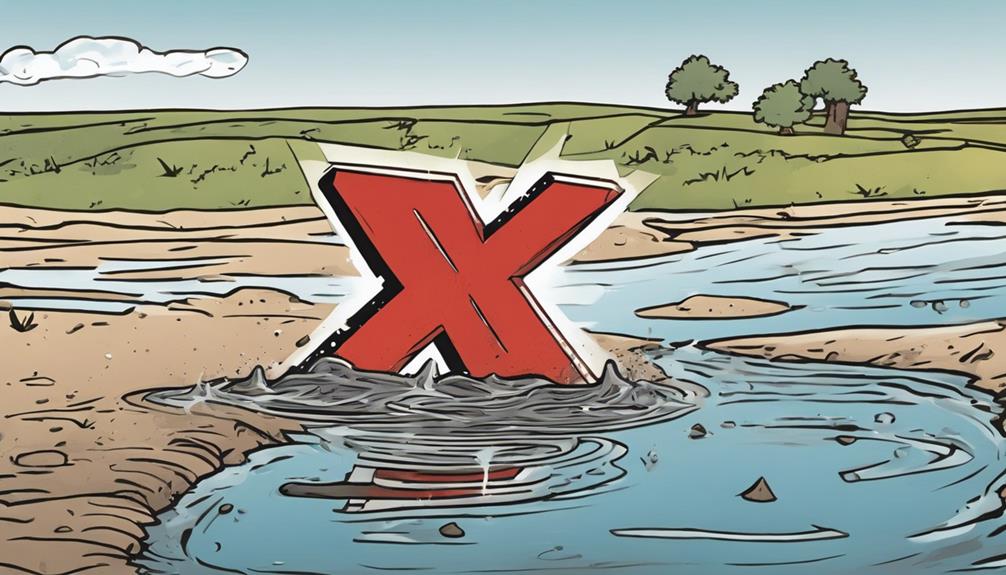
When cleaning your solar panels, it's crucial to avoid using high-pressure hoses, which can damage the panels and even void their warranty. Instead, utilize a regular garden hose or a telescopic wand to spray the panels.
You should also steer clear of harsh cleaning solutions and hard-bristle brushes, as they can scratch the panels. Opt for a mild cleaning solution and soft-bristle brushes to guarantee a safe and effective clean.
Additionally, monitor the panel's efficiency after cleaning to confirm it's working at its best. By following these tips, you'll be able to keep your solar panels clean and in good condition, making sure you get the most out of your investment.
Water Quality Matters
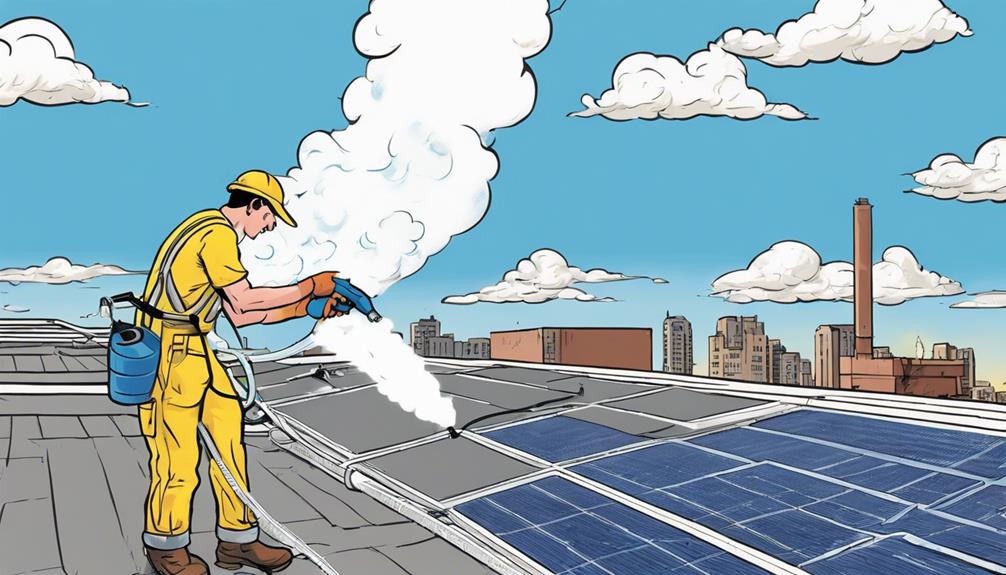
Using hard or mineral-rich drinking water to clean your solar panels can leave behind deposits that reduce their efficiency, so opting for clean, mineral-free water is essential instead.
Hard water can cause brittleness and water spots on your panels, which can lead to a significant decrease in their performance.
When cleaning your solar panels, use soft water and plastic scourers to scrub away dirt and debris. Avoid using harsh detergents or high-pressure sprayers, as they can damage your panels.
Safe Cleaning Methods

You'll want to choose gentle, low-pressure cleaning methods to make certain your solar panels remain safe and efficient. Avoid using high-pressure hoses, as they can harm panels and void your warranty. Instead, use a regular garden hose or telescopic wand to spray your panels.
Here are some additional tips to keep in mind:
- Use mild cleaning solutions and soft-bristle brushes to prevent scratching your panels.
- Avoid hard-bristle brushes and harsh detergents that can harm your panels.
- Monitor your panel efficiency after cleaning to make sure they're working at their best.
- Clean your panels frequently, especially in pollen-prone areas.
- Experts recommend cleaning your panels at least twice a year to maintain their efficiency.
Cleaning Schedules and Tips
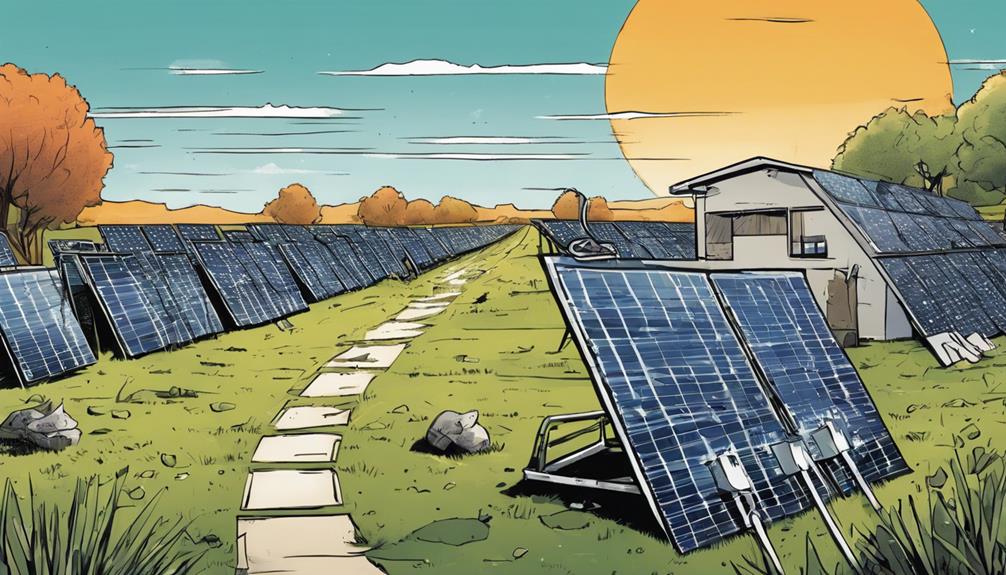
Regularly cleaning your solar panels is essential to maintain their efficiency, and experts recommend doing so at least twice a year, or more frequently in areas prone to heavy debris accumulation.
If you live in a pollen-prone area, consider cleaning your panels more often to prevent buildup. The best time to clean your panels is in the spring, when debris has accumulated over the winter months.
When cleaning, use a garden hose with a soft brush to remove dirt and debris. Avoid using hot water or high-pressure sprayers, which can damage your panels.
Safety Precautions and Risks
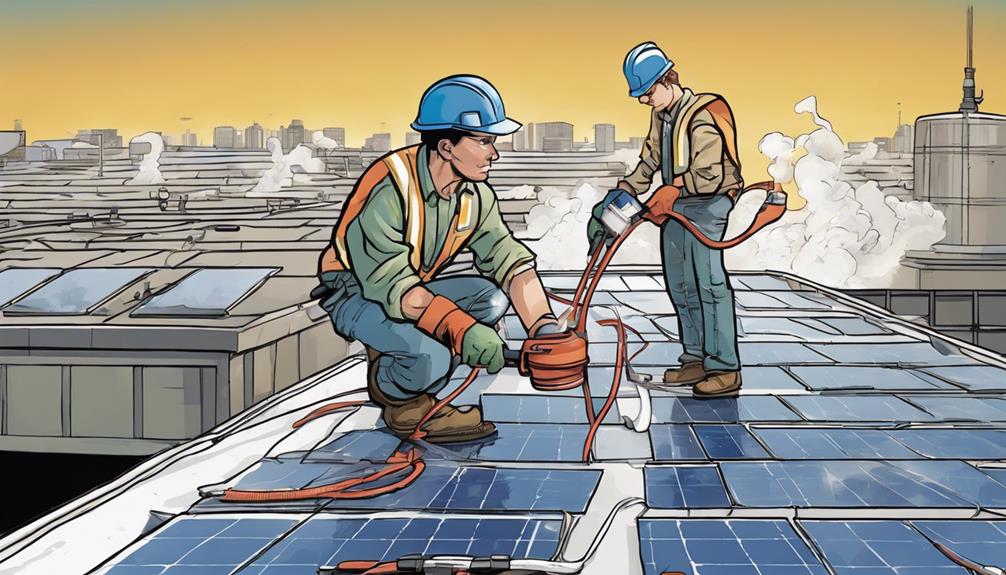
When cleaning your solar panels, you'll want to exercise caution to avoid damaging the equipment or putting yourself at risk. Take the time to familiarize yourself with the necessary safety precautions.
Here are some essential safety tips to keep in mind:
Avoid touching wiring and hot glass to prevent electrical shock and burns.
Wear protective clothing and gloves to shield yourself from sharp edges and debris.
Be aware of the risks involved in cleaning panels, especially if you're not comfortable with heights.
Purchase a special nozzle for high-pressure hoses to prevent damage to the panels.
Clean panels at least once a year to maintain efficiency and prevent damage from debris buildup.
Frequently Asked Questions
Can I Clean Solar Panels During the Winter Months?
You can clean solar panels during winter, but be cautious of cold temperatures and potential snow or ice. Use a gentle hose spray and mild soap to avoid damaging panels.
Can I Use a Power Washer to Clean Solar Panels?
Don't even think about it Don't risk damaging your solar panels with a power washer, which can void your warranty and leave them in shambles. Instead, use a gentle garden hose and soft brush to clean them safely.
How Often Should I Inspect My Solar Panels for Damage?
You should inspect your solar panels regularly for damage, ideally every 3-6 months, to guarantee peak performance and identify potential issues before they become significant problems.
Can I Clean Solar Panels at Night or in the Dark?
"No, don't clean your solar panels at night or in the dark. Imagine scratching or damaging them without even seeing what you're doing As you clean, you need to see the dirt and debris to remove it safely and efficiently."
What Happens if I Don't Clean My Solar Panels Regularly?
If you don't clean your solar panels regularly, dirt and debris will build up, reducing their efficiency and energy output, ultimately increasing your electricity bills and shortening their lifespan.
What are the safest and most efficient ways to clean solar panels?
When cleaning solar panels, it’s important to prioritize safety and efficiency. To avoid health hazards in solar panel production, use a non-abrasive sponge or cloth with mild soap and water. Avoid harsh chemicals and excessive water pressure. Regularly inspect panels for dirt and debris to maintain efficiency.
What are the safest and most efficient methods for cleaning solar panels?
When it comes to cleaning solar panels, it’s important to prioritize safety and efficiency. Using a soft brush or sponge with soapy water can effectively remove dust and debris without causing any health hazards in solar panel production. Additionally, regular maintenance and gentle cleaning can help maximize the panel’s energy output.
What are the recommended methods for safely cleaning solar panels to maintain efficiency and avoid health hazards?
When it comes to maintaining efficiency and avoiding health hazards in solar panel production, it’s important to use recommended methods for safely cleaning solar panels. This may include using non-abrasive cleaning solutions, soft brushes, and avoiding harsh chemicals to ensure both the longevity of the panels and the safety of workers.
What are the best methods for safely cleaning and maintaining solar panels on tile roofs?
When it comes to solar panel installation tips on tile roofs, the best methods for safely cleaning and maintaining the panels include using a soft brush or sponge with mild soap and water. It’s important to avoid harsh chemicals and abrasive tools that can damage the panels. Regular maintenance and inspections are also crucial for optimal performance.
Conclusion
You've made it! Now that you're armed with the know-how to safely clean your solar panels, you can breathe easy knowing your investment is protected. By following these expert tips, you'll be harnessing the sun's energy in no time.
Remember, a clean panel is a happy panel, and a happy panel is one that's working efficiently to power your home and your savings.
